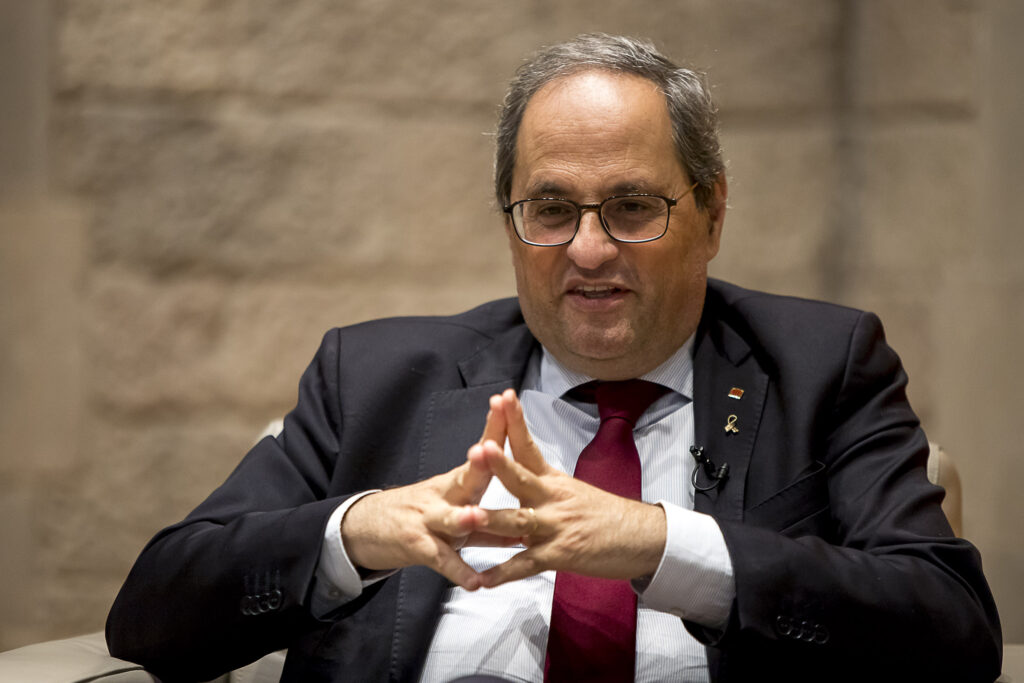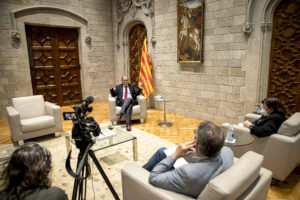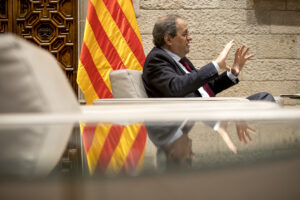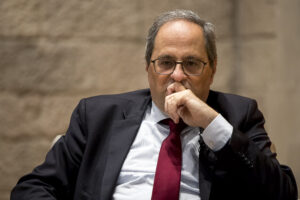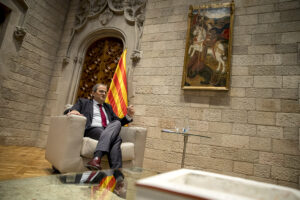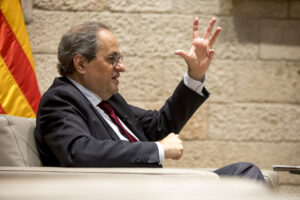28.09.2020 - 14:45
|
Actualització: 28.09.2020 - 16:45
[This interview was published in the Catalan version of VilaWeb on Sunday, the day before Quim Torra was disqualified and ousted by Spain’s Supreme Court. It is, therefore, his last interview as President of Catalonia].
As we interview Catalan president Quim Torra, we are keenly aware that these are likely the last few hours of his term in office. Political tension is so palpable in Catalonia that even the nearby orange trees seem to cast a darker shadow on the walls of the Palau de la Generalitat’s gothic gallery. It is noon. The carillon and the bells of the cathedral sound in unison, as the rattle of a carpenter’s drill being used to mend a window strives to ring above the clattering clamour. The wind has left us a cloudless, bright blue sky. We know that news of the court’s decision to disqualify the Catalan president may arrive during our interview. We check our phones until the last minute. It doesn’t.
—It won’t be long before you are removed from the office of president. How do you feel about it?
—Everything that’s happened in the last few months and years has exposed the limits of Catalonia’s home rule. Our parliament cannot sign to law the resolutions it adopts, we have 2,850 people facing reprisals and we may soon have a president who has been disqualified for standing by the freedom of expression. Catalans must realise that we cannot go on like this. We cannot keep crashing into the walls of home rule and stay within them. We should realise that, sooner or later, our nation must make a collective leap forward. That will require a fresh start, a democratic break and standing up for independence. This is the most important message I’d like to send out. We’ve reached a point where what’s at stake is whether Catalonia’s home rule will get the better of us or we will truly do what needs doing together. And that can only be a democratic break.
—You agreed to become president with a view to accomplishing that. But you haven’t.
—I’d like to address the people who have never quit, ordinary people who keep working for independence, people who have shown me their support but might feel let down because we haven’t got any further. I can understand their disappointment. When we fall short of our goal, any independence supporter will feel somewhat disappointed. But, at the same time, ours is a struggle for hope, to quote Josep Benet. We must keep the perspective of the key dates and know that an independence process requires a straight line which, as I said earlier, demands a democratic break.
—Why didn’t that happen?
—We have found ourselves in an extremely complex situation. I think it’s funny when someone tries to draw a line between the Spanish judiciary and the executive branch. All the powers of the state have been toiling in a coordinated, systematic manner to persecute Catalonia’s secessionist movement and that’s had an effect. We must admit that Madrid’s crackdown has had an impact on us and many of our efforts have gone into defending ourselves from it. To a great extent, that explains why we haven’t made any headway. I also think that, in order to make that collective leap forward, we require the will of a majority in the Catalan parliament and perhaps that’s been missing. That’s why the next elections will be critically important.
—Why is that?
—Because we need a majority [of MPs] who are determined, committed and will live up to the historic moment. We cannot go on with our devolved powers [effectively] suspended as we endure Madrid’s clampdown. We must bring back the winning spirit of 1 October [2017, when the vote on independence was held], which is about challenging the state with a break and collective disobedience. Personal or individual disobedience is not the answer. We will achieve independence with a collective leap or we won’t at all.
—We could have been ready when the verdict [in the case of the jailed independence leaders] was handed down in October 2019.
—It was a disappointing time that attested to the Catalan political parties’ impotence to agree on a joint response at such a crucial point. I spoke in parliament to propose a referendum but my idea wasn’t met with much enthusiasm, generally speaking. However, I can’t see another way forward: a referendum or a plebiscite-like election. In either case, once you have won the vote, you reaffirm the result of the 2017 referendum. It’s obvious that in October 2017 we failed to defend the democratic validity of the referendum result through civil disobedience. This is what I think we need to work on to make that possible.
—The other day in court you told the judge that you didn’t intend to waste one minute of your time with him, which represents a new stance, not entirely unlike Malcolm X’s “duty to be blunt” [as mentioned by Saïd Bouamama]. Sometimes we get the impression that you have been stuck between the coalition agreement and the obsession over having an effective government and, therefore, president Torra has had to do stuff that he wouldn’t have done as an ordinary citizen.
—Perhaps. These months have been exceedingly complex. First we had the trial [of the 2017 independence leaders] with different defence strategies. I’ve never given my opinion on the matter out of respect for them: everyone is entitled to choose their own strategy. Whether you agree with it or not, the trial set the pace of my term to a great extent. Everyone had to put on a balancing act. Still, we opposed Pedro Sánchez’s budget bill and I’m bringing this up because I feel it is very important. We’ve been loyal to our two banners at all times. That was a red line as far as I was concerned: standing by Catalonia’s right to self-determination and an amnesty [for the political prisoners] as a way to end the crackdown. These are the two common denominators that the pro-independence movement has managed to salvage. I would have liked to have gone further, but I wasn’t able to, everyone knows that. I do get the feeling that perhaps we could have achieved more, had we tried something else.
—You have found yourself increasingly alone as time went by.
—By itself, this building makes you feel somewhat lonely. When you must make decisions at extremely challenging times you feel that you are on your own, more than I had ever imagined. We’ve had a string of natural disasters: floods, fires in petrochemical plants and then a pandemic. I’ve felt the most isolated in this building, the Casa dels Canonges [the president’s official residence], having to make decisions at a very testing time. Myself, I was ready for anything, including prison, if necessary. And, yes, I wish everyone had been willing to pursue the same goal. But I won’t start an argument over that or point any fingers. Everything is incredibly complicated. I cannot fault anyone. Everyone must rise to the challenge and, as president, that’s what I’ve tried to do.
—Did you think it would be easier?
—You might think me naive, but I had thought that the goal of independence might help us to come together. When we devoted endless hours and meetings to discussing how to best respond to the verdict and we managed to persuade the secessionist majority to sign a national agreement for self-determination, amnesty and the end of repression, I thought to myself: “Well, we’re running late, but there’s something here”. But then we were unable to carry it out. The people were up for it, but it didn’t go ahead. I’ve anguished over letting the people down. In light of their efforts, it pains me a little to let them down at a time like this, when we are at the receiving end of such a crackdown. Perhaps it’s because I’m not much of a career politician. Maybe that’s why, at the most difficult of times, when you can feel your heart racing and your blood boiling and you feel like throwing caution to the wind, I’ve tried not to blow up the last bridge. That was important for me, too. Nobody understands finger-pointing [within the pro-independence camp]. Keeping that line open was also important. I might have paid a price for that, but I don’t mind because I’m not here to make friends or enemies. I came here to win independence for Catalonia. As I’ve always felt that we won’t succeed unless we do it together, I’ve always thought we couldn’t turn our backs on the people. Sometimes this required a great deal of patience on my part.
—Is progress possible when you have no control over the political parties and the higher echelons of political appointees in the administration?
—The people have asked the political parties to speak clearly. The other day Josep Costa, the deputy Speaker, said: “do not ask us to stand together, ask us to achieve independence”. I like his sentence. We have a duty to be clear: how we will go about it and in what way. I think we owe that to the general public. I’ve come to the conclusion that one of the hurdles on the path to independence is Catalonia’s home rule. My term in office has exposed the limitations of our devolution: the top civil servants, the Catalan police force and any collective you could think of. We must bear this very much in mind when planning our collective leap.
—You said earlier that you’d been unsuccessful. With that hindsight, how should it be done?
—We must be aware that Catalonia’s civil service will lay many hurdles on our path. We need to come to terms with that. When you choose to disobey, you must accept that repression may come from the Catalan administration itself. This poses the biggest challenge at present.
—Can’t that be taken apart somehow?
—I wouldn’t use the phrase “take it apart”. Instead, it must be overrun. And the people will do that with their ballot. If there is a majority for independence, then we will be independent. That’s the way it is. It requires a number of decisions about how to organise ourselves and focus the secessionist movement on what it is: a struggle for a clean break and regeneration. At present the only movement in Spain that truly aims to break away from the 1978 regime is Catalonia’s independence effort. Funnily enough, that’s us. It is a very valuable thing. We are the people who want to switch things around, who are challenging the status quo. We’ve seen what happened to other movements. They’ve been broken down by the mighty stomach that is the Spanish state. Catalonia’s independence movement must preserve this great asset, its revolutionary nature.
—The pandemic has exposed the limits of home rule. At the start everything felt slightly unreal, as if the entire institutional edifice had collapsed on the whim of a single person. We had no masks because a man in Madrid didn’t know where to buy them …
—I agree that when you look back, it seems somewhat unreal. It’s also a time when you see people for who they really are, with warts and all. Some muck in, some lead, some are watchful of the situation while others walk away from it. At that time Spanish PM Pedro Sánchez was a huge disappointment to me. I recall how in that two-week period when Catalonia was in grave danger —as was Madrid— I kept asking for a total lockdown. We got it fifteen days later. In those days I used to send Mr Sánchez a message every day. I did what arguably nobody had done before. I begged PM Sánchez to order a lockdown because many lives were at stake. His answers were a big disappointment to me. I even asked him to ignore the fact that the idea was initially mine and just do it. People were going to die. Then I saw a PM who felt pressured by other factors, other than those. I got the feeling that I finally saw his true colours.
—So what is Pedro Sánchez really like?
—He is a primer minister who wants to be prime minister and will break bread with anyone and change his policies as necessary in order to stay in power. That includes promising to amend the crime of sedition in Spain’s criminal code [which might expedite the release of the Catalan political prisoners] or ignoring his promise of formal bilateral talks [between the Spanish government and its Catalan counterpart]. It might have something to do with the theory of resistance, but I’ve always thought that you must pursue what you believe in in a straight line and PM Sánchez is the windiest person I’ve ever met. It’s been an extraordinary show, witnessing his sleight of hand these two years, watching him perform little magic tricks for us so that he could stay in power.
—What other lessons have you learnt from these years?
—The lessons from these years? I’ve learnt all sorts of lessons: from grassroots activists in street protests, from the pandemic, from the trials … We have the power to win. We have it now. I don’t know when, but we must go for it as one.
—What do you think about a [hypothetical] official pardon [for the Catalan political prisoners]?
—This thing about a pardon has only cropped up just now! All these years they’ve dangled a carrot before our noses. It’s all been a ruse and we’re no better than we were. If we opposed Pedro Sánchez’s previous budget, why should we support his next one? Our prisoners are still in jail, our exiles haven’t returned, the list of Catalans facing criminal charges keeps growing. Now they have agreed to review a pardon request, something they can’t refuse to do. Fine. What does that solve? Nothing. The only possible solution would come from an amnesty law and, as far as I know, there is a majority in the Spanish parliament that would be able to resolve the Catalan conflict if they wanted to, politically speaking. Tabling an amnesty bill would be a genuine gesture. Agreeing to review a pardon request is not. It is merely an administrative step that bears no value. We’ve heard enough fairy tales, thank you very much.
—Are they taking it out on the prisoners?
—If I spoke my mind, you’d be shocked. Last week I visited Jordi Turull [whose father has recently passed] to give him my condolences. President Puigdemont’s father also passed away [some time ago]. We are witnessing cruelty and inhumanity of a kind I never thought I’d live to see. I’ve only known [the Catalan political prisoners] for a while, but others have known them for years and they just look on as if it didn’t concern them. When the father of [Ciudadanos leader] Carlos Carrizosa passed away I rang him up. I expect a modicum of humanity, at the very least. Does anyone think we can continue like this while family members of the prisoners and exiles are dying? Please don’t ask me any more questions about this because I won’t be able to measure my words.
—One last question. Are they getting rid of you like this because you have been a nuisance?
—I think I have been a real pain for them. They got the idea that I was a pain in the backside and they had to get rid of me. It is somewhat satisfying to have p***ed them off so much. I mean it. Carrasco i Formiguera, the 20th century Catalan leader that I admire so much, used to get called a radical nationalist in the Spanish parliament, to which he would reply: “That’s the nicest compliment I’ve ever been paid!” Well, I sort of feel that way, too.
